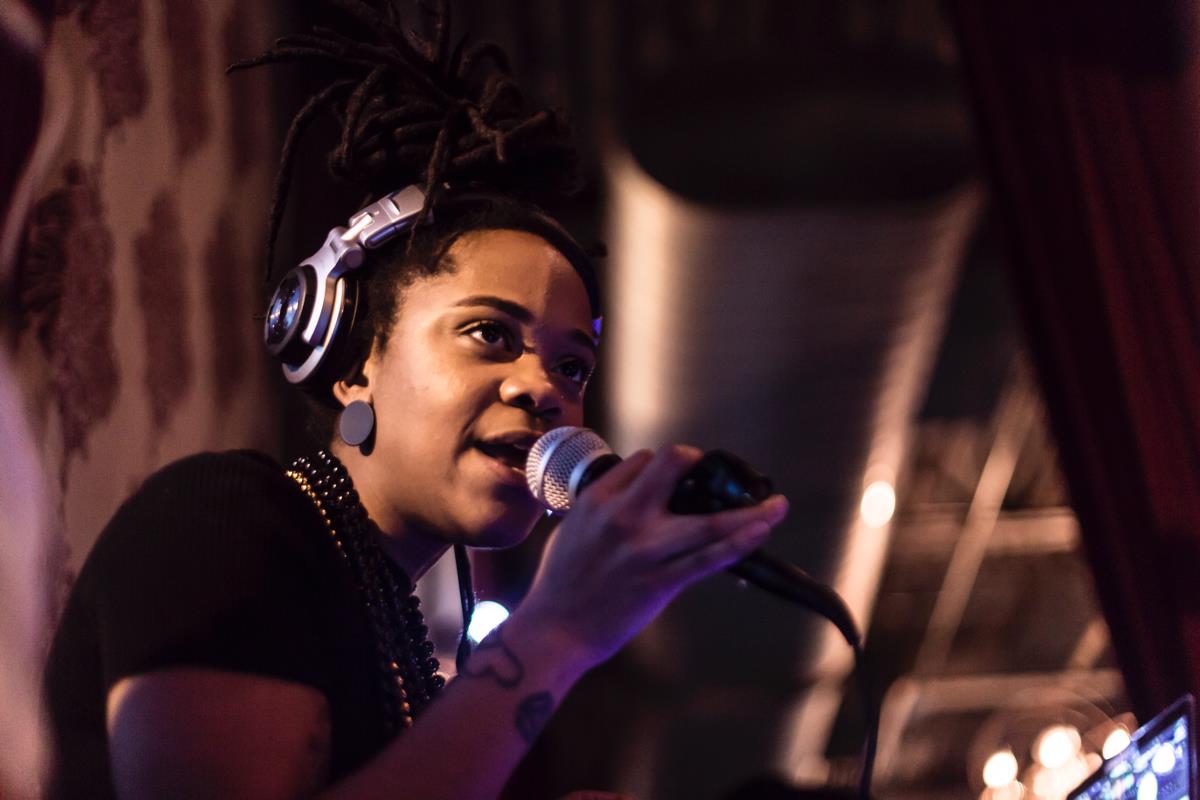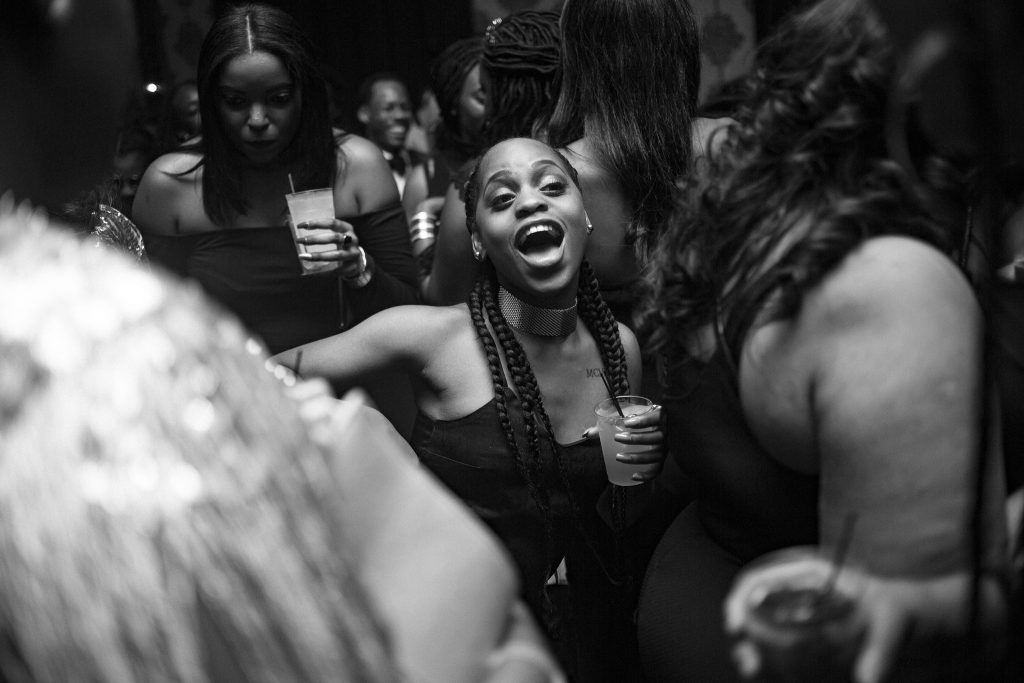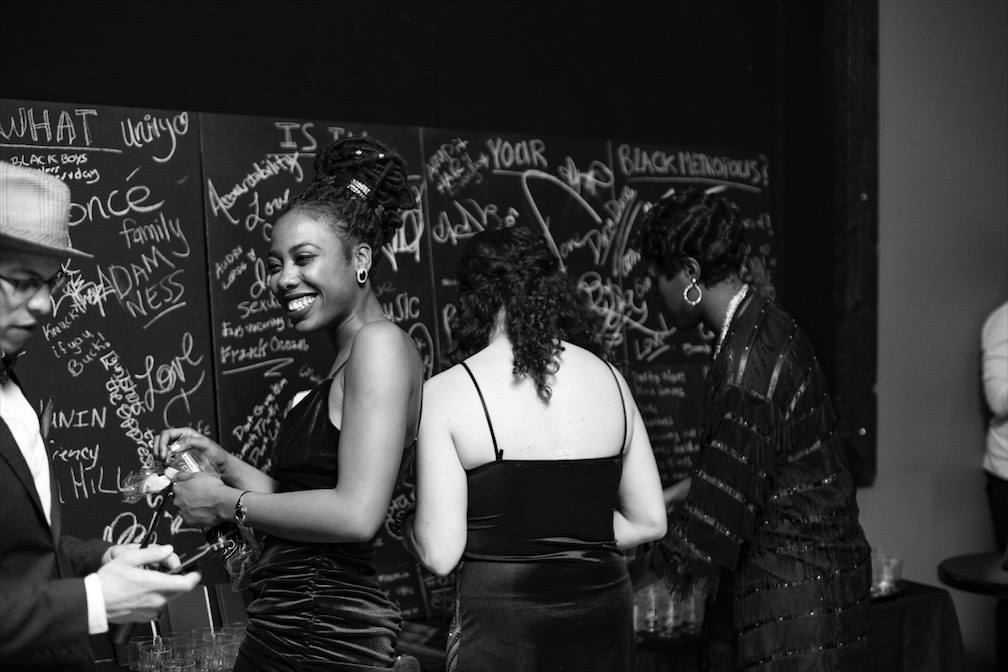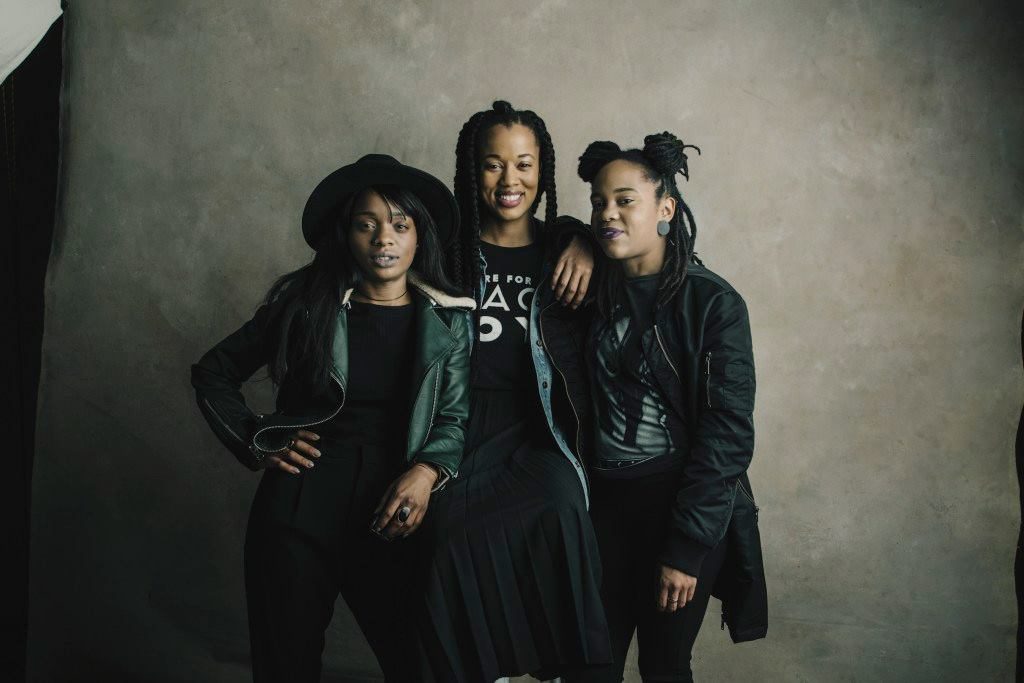Joy as Resistance: A Conversation with Rae Chardonnay
Beloved Chicago DJ and one of the minds behind Party Noire discusses her practice and why we must celebrate and embrace our joy.

Rae Chardonnay is a DJ, curator, native Chicagoan, and one part of the trio that activated the monthly dance event Party Noire. This event, which Chardonnay describes as “a warming, energizing day party in an intentional space that is geared towards the upliftment and affirmation of the lives of Black women across the gender spectrum,” has served the multifaceted Black community of Chicago since the spring of 2015. Last week, I met with Rae to discuss what went into making this event series, the perks and challenges that face Black artists and millennials living in Chicago, and her thoughts on resistance, inclusion, empowerment, and the importance of Black Joy.
Ida Cuttler: How long have you DJ’d, and will you tell me a little bit about what drew you to this initially?
Rae Chardonnay: I have been DJing for 7 years. I love to make people dance, and I have always loved to make people dance. Just as much as I have always loved the idea of trying out things with sound. In DJing, there’s so much space and room for growth in learning about sound and sound design. Music has always been a big part of my life. I became really attracted to the technical aspect of DJing. As a DJ, I have a lot of power and control, while at the same time I always keep in mind a consideration for the space and the people who are in that space.
IC: I listened to your music on mixcloud, and I thought it was really great and varied and had a lot of personality. What is your process when coming up with a mix?
RC: The stuff on my soundcloud and mixcloud are live recordings. I don’t really plan my mixes – they happen in the moment. I take cues off what is happening in the party, and then I play what I want to happen next. It’s a challenge, and it’s exciting. As far as Party Noire, we’re dancing from top to bottom. Not too much of a warm up set – as soon as people come in I want them to feel like they can dance.
IC: Are female DJs rare in the music community?
RC: I feel like the number of female DJs is growing increasingly. The majority of women I have met who are DJs try to do it as often as they can. I think, like me, women DJs got into it because they have a passion for music and sound. Even if these women want to go into other parts of music, DJing is the thing that they know they can do to help them get there.

Scenes from Party Noire. Photo by RJ Eldridge, 2016.
IC: Is the fact that Party Noire takes place during the day because of scheduling with the venue or is it intentional?
RC: It’s intentional. Day parties have become increasingly popular, and in our day parties we hope to foster a place for dancing and for networking.
IC: Were you involved with Party Noire from the very beginning?
RC: Lauren Ash initiated the idea for a collaboration, and we were all for it. We came up with the idea for the day party, and it just worked out. It wasn’t just a one-woman thing, it was a let’s see what we can all put together to really make it happen. Party Noire happened very organically and quickly.
IC: Do you see spaces like Party Noire and events for this specific demographic lacking in other places and in other aspects of Chicago life and culture?
RC: Absolutely. Party Noire grew out of need for that. I kept running into people in the arts community, and the conversations that we would have were about music and culture and “Oh you like the new 2 Chainz song! I do too,” and we realized we needed to make a space to foster that kind of connection. Party Noire also grew out of a need to respond to the social climate – we wanted to develop something beautiful to contrast all the negative things that were and are happening for the Black community in the city of Chicago and outside the city of Chicago. It was necessary for us to see and set a distinct mission for Black Joy.
IC: Do you think the experience people have who come to Party Noire Community is something exclusively specific to that group of people?
RC: Being Black and being Femme are experiences that if you are neither you can’t even fathom what that means.

Scenes from Party Noire. Photo by RJ Eldridge, 2016.
IC: Will you speak to how Party Noire seeks to serve the millennial demographic?
RC: Nothing is the way that an older generation said it was going to be, and millennials are the only ones who are going to realize that, because we are the only ones that are living it. Everyone’s families thought, “Oh you’ll married by thirty” or “You will have this awesome job.” We go to college, and that sustains us halfway through college, and then we are like “This kind of doesn’t make sense.” Myself, I am very lucky to have a supportive family, but not everybody gets that. I know people, artists, who have families that say, “Y’all need to get jobs,” and who don’t understand the experience they are living, who don’t understand we have jobs that don’t pay near enough. Party Noire is a release of some of that pressure. It’s a release of some of that weight.
IC: It also seems like Party Noir upholds the importance of celebration.
RC: Yes, sometimes we forget to celebrate. It’s necessary. The media doesn’t want us to do that – it’s not a thing, to see Black people happy. Party Noire makes Black Joy an act of resistance. Joy as resistance, twerking as resistance.
IC: Do you have an experience of going to a party, or an event, and finding yourself not in a positive and joyful atmosphere?
RC: There are certain spaces that are not the atmospheres that I am longing to grow in or cultivate. There are spaces where people DJ, such as in the club circuit, that are more about “selling the bar.” When you are in an intentional space, like Party Noire, from the jump you are letting people know that you stand for something, that there are causes you care about. At Party Noir we say, “We are here for Black Joy, we ask that anyone who comes into our space respects that.” And people do. People meet and share these things and then build amazing relationships.
IC: In what ways does Party Noire play an active role in concepts of empowerment and inclusion?
RC: We’ve gotten so much great feedback on how comfortable people feel in that space. There is some of everybody who comes to Party Noire: There are teachers, activists, academics, bankers, doctors, and they are all in there for Black Joy and to celebrate Black Femmes. Party Noire celebrates and preaches an identity awareness within our own community. People who consider themselves queer or straight or anywhere on the gender spectrum, they all come to feel beautiful together.

Party Noire founders, Nick Alder, Lauren Ash, and DJ Rae Chardonnay. Photo by RJ Eldridge, 2016.
IC: In what ways has its message grown/expanded/changed overtime?
RC: The original message is still there. I think that is because the message is so simple and because we make it very clear on all of our platforms and on all of our social media. We are here. We are not budging. We are not looking to sell out. There is always someone at the events who I have never seen. The community is growing because people tell their friends about us. As far as the future, we know that we want to continue to make magnanimous, amazing things. We are good at knowing each other’s strengths and appreciating and using that to put Black Femmes at the forefront of everything we do.
IC: Do you find that it is ever tough to balance your role as a facilitator and your art?
RC: I feel like they complement each other. Sometimes, it’s hard to manage my time. Sometimes, I’ll find myself focusing more on facilitating and administration then I’d like to, but I am always making time for music – even if that means staying up until four or five or six in the morning, because right now I am a full-time artist, and that is what you do. It has been interesting to determine ways to grow as an artist, to constantly be thinking about what’s the next thing and what is the next step.
IC: Will you tell me a little more about your other side projects?
RC: I have a project called Black Eutopia, which is a research program series that I am still developing and that gets activated in a lot of different ways. The idea behind it is to reimagine and reclaim ideal spaces for Black people in the context of migration, and the ways art and labor intersect for Black communities.
IC: I saw that you were going to speak at the Lake FX event on April 22nd for the panel The Party Politic. What do you hope that the people who come to hear the talk will get out of it?
RC: I feel super excited about that event. I don’t have any expectations. I hope to speak my piece in my most authentic voice and see where that goes and where that leads me to.
Hear Rae Chardonnay speak on Saturday, April 22nd at 12pm for “The Party Politic: Building Movements through Movement” at the Lake FX CreativeCon–the largest free summit for artists across disciplines in the midwest.
Featured Image: Rae Chardonnay. Photo by RJ Eldridge.
 Ida Cuttler is a writer and performer living in Chicago, Illinois. She is an active ensemble member of the Neo-Futurists. Ida’s live lit credits include The Arrow, The Paper Machete, Write Club, The Annoyance, and Cool Shorts. Ida’s essay “How did I Happen” was published in Storyclub magazine’s online publication. Additionally, Ida frequently contributes content to the Neofuturist blog. More of Ida’s writing can be found on her Medium.
Ida Cuttler is a writer and performer living in Chicago, Illinois. She is an active ensemble member of the Neo-Futurists. Ida’s live lit credits include The Arrow, The Paper Machete, Write Club, The Annoyance, and Cool Shorts. Ida’s essay “How did I Happen” was published in Storyclub magazine’s online publication. Additionally, Ida frequently contributes content to the Neofuturist blog. More of Ida’s writing can be found on her Medium.